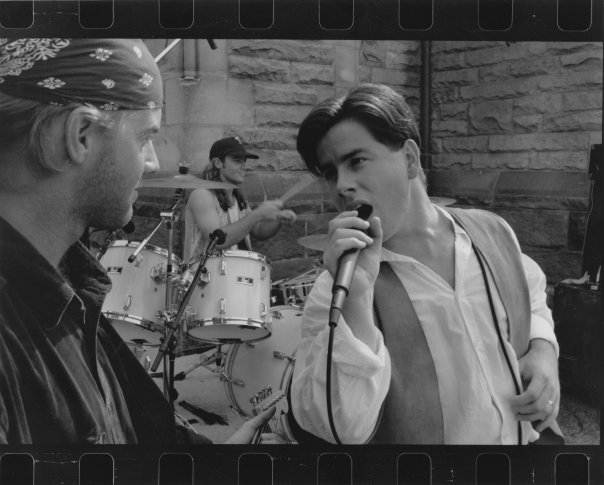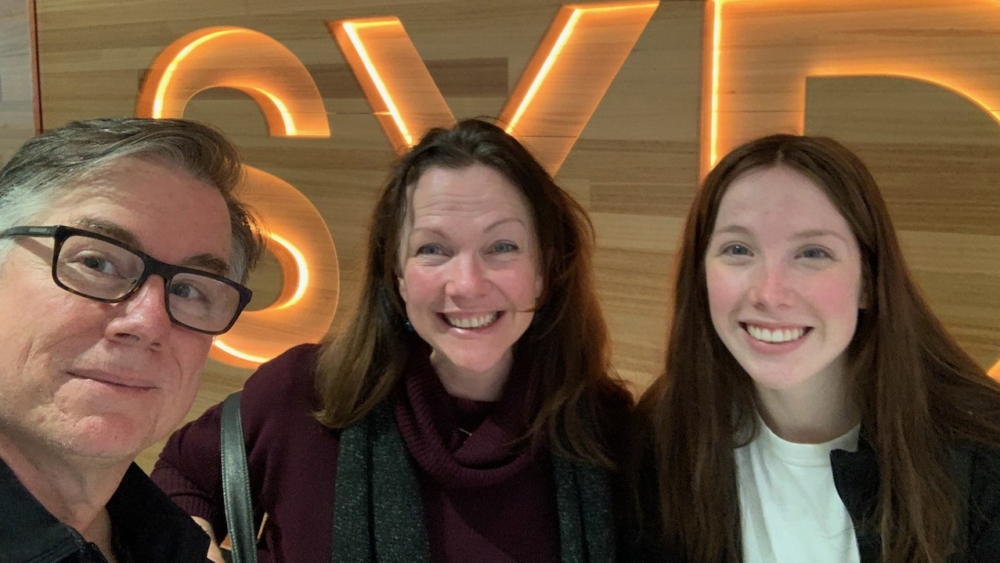Musician turned historian owes his faith to two women
John Dickson shares his Christian journey
Historian, author and podcaster John Dickson tells Anne Lim how he came to Christ as a 16-year-old smart alec. With his band In the Silence, he performed at churches, schools, jails and communities across Australia in the 1980s. He currently lives in the US and is the Jean Kvamme Distinguished Professor of Biblical Studies and Public Christianity at Wheaton College, Illinois, as well as host of the Undeceptions podcast.
I came to Christ through a personally compelling, but not at all pushy, volunteer Scripture teacher at Mosman High School. Glenda Wheldon was just utterly compelling and funny and had answers to all my smart-alec questions. And I’d never met a Christian like that. I had never been inside a church before I was 16.
We never said grace or any prayers at home. My parents never sent us to Sunday school, never went inside a church. But almost 80 per cent of us went to those SRE classes because we had to do homework supervised by a real teacher if we didn’t.
I remember asking her after class, “What do you think God thinks of me – if he’s true?” And she said, “Oh, John, God can see everything you’ve done, said and thought,” which is a brilliant answer because she then left a really awkward pause to make me feel the weight of that. And then she said, “But he loves you even still.” And so, in that briefest of replies, I got the framework of the gospel: that I’m not everything I should be, God knows everything and he still loves me.
So when she invited the class to her home for hamburgers, milkshakes and scones on Friday afternoons after school, I was just a little bit interested. I’m thrilled that we did because about five of us became Christians through her. Three of us, including my friends and later bandmates Ben Shaw and Angus McLeavy – all from completely pagan backgrounds, went to Moore College and became ministers.
I had lost my father when I was nine; he died in a plane crash in India. It made me even more of an attention-seeking scoundrel than I might have been just by personality. I became a bit of a tearaway, and in my early teens, I was in trouble with the police a bit. I’d run away from home several times, mainly just to freak my mum out. But I think losing my dad made me a little more thoughtful tearaway than I might’ve been otherwise.
It always seemed to me a miracle after I’d become a Christian as a 16-year-old that I already knew the Lord’s Prayer. I can distinctly remember as a 10, 11, 12-year-old, before I went to sleep saying, “Our Father, which art in heaven, hallowed be thy name.” I had no idea what those words meant. I didn’t understand it, but it resonated with me.
Long after I’d become a Christian and was preaching as a student minister at St Clement’s Anglican Church Mosman [now Mosman Village Church], I mentioned that it was almost miraculous or spooky that I knew the Lord’s Prayer long before I became a Christian. And this elderly woman, bless her, Elsie Faithhorn, came up to me after the sermon and said, “Oh, John, it’s not miraculous. I was your babysitter. And I taught you the Lord’s Prayer just after your dad died.” So, I owe my faith to two unreal women.
I instantly was trying to share my faith with anyone and everyone.
Glenda eventually started taking us to her church. I’ve thought about my journey, and I’m guessing that within maybe a year of going to this woman’s home for hamburgers, milkshakes and scones, I moved from being a fan of Jesus to a worshipper. When she read us the gospels, I do remember thinking Jesus was fantastic – this weird combination of immense power that people were terrified of and incredible humility where little kids could sit on his lap and sinners would flock to him. So I remember thinking he was a hero. In fact, I remember people criticising Jesus at school and me almost wanting to punch them. But at some point in that year, I became a worshipper and a crazy little evangelist, too. I instantly was trying to share my faith with anyone and everyone.
When we returned from church to her home, Glenda invariably invited people for lunch – 10, 15, 20 of them. She was the most hospitable person I have ever known in my life. And without fail, as we sat in lunch with these adults, she would ask one of us – Ben, Angus or me – to tell the crowd what we were thinking about Jesus, how we had come to worship Jesus – and we hated it. She confided in us years later that she was just trying to prepare us to be preachers. I remember her saying to me, “One day, I’ll be sitting at your feet listening to you preach.” And I laughed in her face at the thought of it. Sure enough, a few years later, I was off and running, and she came to hear me preach many times.

Ben Shaw and John Dickson perform with In the Silence. Jacques Zeelie is on drums.
So these guys who got converted with me started playing music together in a band called In the Silence. Music was very much motivated by our Christian faith and probably subliminally motivated by every 16-year-old wanting to be a rock star. But ours was a very pious version of it. We thought it would be cool to play in pubs and talk about Jesus. We just played rock music and mentioned our faith in between songs. Eventually, we were gigging so much we had to quit our jobs and before we knew it, in 1988, we were full-time. We were full-time for five years, and we were given an amazing platform. In the end, we were playing 10 shows a week and singing to 5000 or 6000 people weekly. Sometimes, I would go for 10 minutes introducing a song and weaving in my faith.
But we got to the point where we were worried that we were very shallow. So, in 1993, the three of us went to Moore College in Sydney. In fact, so did the band manager, Dougal McKenzie, and Dave Lanham, one of the road crew.
It felt utterly boring compared to my life for the previous five years, running around the world with my best mates, playing music.
I must say it freaked me out. I was committed to the project, but the first year, I hated it, not because I wasn’t good. My marks were straight As, but it felt utterly boring compared to my life for the previous five years, running around the world with my best mates, playing music. But also, in a very snobbish way, I thought, “They don’t know how to speak in a maximum-security prison like I’ve done 20 times.” I developed a kind of arrogance that these people who are just studying the Bible and theology don’t know how to reach the real Australian. I had a bit of a solo singing career by then and a couple of albums, so on Friday, I’d be off to Tasmania, Darwin and Perth, singing and preaching. Doing the real thing is how I thought of it. And it just fed this snobbish thing.
I was almost thinking of leaving Moore College in my second year when two lecturers took me aside. One was Michael Hill, who told me that I would have a preaching ministry and that if I didn’t throw myself into these three years of learning the Bible, I would regret it.
The other was Glenn Davies, who, in his inimitable, convincing way, threw me some tricky theological questions. I bluffed my way through, and he said, “Okay, that’s interesting. I’m not sure that’s what the Scriptures say, but what about this?” And in that moment, I knew I had a long way to go. If I’d come to Moore College to nerd up, I was being an idiot by not settling down. So, by the end of the second year, I started to turn down all the interesting engagements and focus more, so that by the third year, I was a proper nerd.
I started to turn down all the interesting engagements and focus more, so that by the third year, I was a proper nerd.
Straight after graduating, I enrolled in a Master’s degree at Moore College, but it was very clear that my Master’s was far more historical than theological because I just loved the history. I’d be sitting in Moore College lectures on the book of Romans, but I’d be imagining what life in Rome was like. It’s the way my brain works. I eventually thought, “Why don’t I try and become a proper ancient historian?” And so I pivoted from Moore College to Macquarie University, and I felt really nervous about doing that. I felt it would be interpreted as turning my back on Moore College and all that it represents by going into a more secular environment. But I did a big pros and cons thing over the decision, and overwhelmingly, it was clear I should go to Macquarie Uni.
I am super glad I got the “How to Read the Bible from Moore College”, but I thank God that I went into a secular university and learned how to place that New Testament in its ancient context, which I have come to believe is vital both for understanding Scripture but also for reaching the world.
There’s no doubt that once I’d finished my PhD at Macquarie in the ancient history department, the doors opened up to secular media. It’s weird, but it’s true that being a doctor – John Dickson, PhD ancient history – opened doors to being able to write for the Sydney Morning Herald and getting invited to be on the ABC.
These days, I need a little more supernatural energy or to find a way to do things quicker so that I don’t have to work such long hours. But I can’t give up. There’s no way I’ll ever give up on Undeceptions. It’s going incredibly well and growing here in America in a big way. So that’s exciting; the thought that I speak to so many thousands of people in a podcast every week is unreal. Unreal. But so is Wheaton. It’s a joy to teach here.


